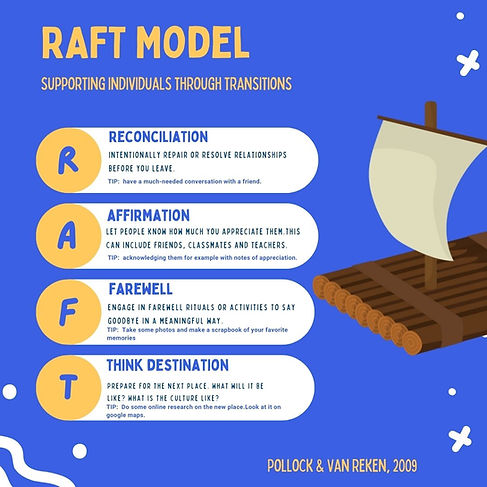Supporting Your Family Through Sudden Changes & Urgent Transitions
With every transition there is loss as well as gain. -Ruth Van Reken
Change can be really tough. Sudden and unexpected transitions, such as transitioning back to your passport country on short notice, can be overwhelming for families. These changes affect not only those leaving but also those staying behind. Navigating this uncertainty requires care, open communication, and thoughtful planning.
Children and young people may not always recognize the losses they experience. Transitions are often framed positively when presented to children, which can delay their understanding of what’s been lost until later in life. This is particularly true for Third Culture Kids (TCKs), who may face academic challenges when moving between different educational systems. These transitions can lead to new growth opportunities for students, yet can also be accompanied by big feelings of loss and uncertainty. These difficulties, if not addressed, can contribute to psychological distress.
By being mindful of a few key principles, you can help your children feel safer and more prepared for changes coming their way.
First, take the time to talk as a family. If needed, have separate conversations with each child. Explain the change or uncertain situation you are facing in clear and simple language that your child can understand. Be sure to focus on what you clearly know, and be honest about what you don’t know. Making this distinction will create clarity for both you and your child and help you define what you want to focus on when preparing for change.
If the transition your family is facing is a result of a global event, keep in mind that your children may be exposed to information from many different sources. Make sure to ask them what it is they already know and if they have more questions about the change occurring and how it may impact your family.
You could say something along these lines:
“Big changes at my workplace are happening and that means we may need to move away soon. I don’t know exactly all the details yet, but here is what I do know….Do you have any questions?”
“This is upsetting for me and probably is very confusing for you too”.
“I know we can go through this together as a family, no matter what happens. This is not the first time that something unexpected has happened to us and we always manage to find solutions”
Acknowledge the emotions that come with transitions. Feelings of sadness, anger, withdrawal, or anxiety are common — and it’s okay to feel them. However, it is also okay to feel indifferent or not be sure what it is that you feel. Talking openly about your feelings as a family will help everyone feel validated, understood and supported. When talking about difficult feelings, be sure to also brainstorm what helps you cope with negative feelings when they arise and how you can help one another in difficult moments. Encourage creative outlets like drawing or storytelling to express emotions.
When talking with your child about an upcoming change, helping them to identify their coping mechanisms, needs and personal strengths can make the big feelings that come with transition feel more manageable. Establishing familiar routines and finding sources of comfort can also provide a much-needed sense of stability, especially for young children. Let them know that they will not have to navigate this change alone, and that it is okay to ask for help. Creating a change care plan can also help them to identify the changes happening in their lives, and what skills they may already have in their toolkit to navigate this transition.Using the Linden Transition Plan can guide conversation with your child that emphasizes their strengths and help them to expand their resilience toolkit. Helping them to identify these tools and resources, can help empower them to navigate difficult transitions.
If your transition is final - Take time to build a RAFT. The RAFT model—originally introduced by David C. Pollock and Ruth Van Reken in Third Culture Kids Book —can help us through changes of all kinds, including transitions induced by the current global changes. LINK

As parents and caregivers, it's crucial to remember that your well-being is essential too. Prioritizing self-care isn't just beneficial for you, it is essential in allowing you to handle challenges and providing the love and support your family needs.
Here are some age-appropriate resources to help both caregivers and young people navigate these transitions:
Books and Movies about Transitions for Young Children:
- “The Invisible String” by Patrice Karst – A story about staying connected even when far apart. LINK
- The Raft That Soared: Dedicated to kids and families on the move, everywhere LINK
- DOWNLOAD A TRANSITIONS CARE SHEET FOR KIDS
For Teens:
- YouthCompass is a cross-cultural community program which addresses the unique needs of mobile teens LINK
- Cross Cultural Kids Website
- DOWNLOAD A TRANSITIONS CARE SHEET FOR OLDER KIDS
For Parents/Caregivers:
- Safe Passage: How mobility affects people & what international schools should do about it, by Douglas W. Ota LINK
- Resources for adult Third Culture Kids (ATCKs) LINK
- DOWNLOAD A TRANSITIONS CARE SHEET FOR ADULTS
Transitions are challenging but also offer opportunities for growth and connection. As you and your family navigate change, Linden counselors are here to support you. Connect your child with a Linden counselor here, and learn about how we can support your family through every step of this transition.

